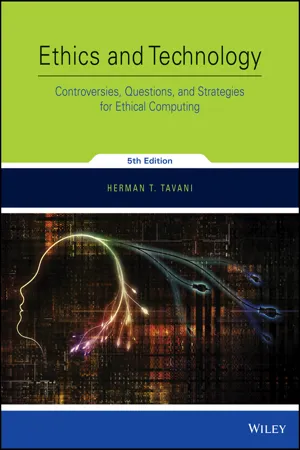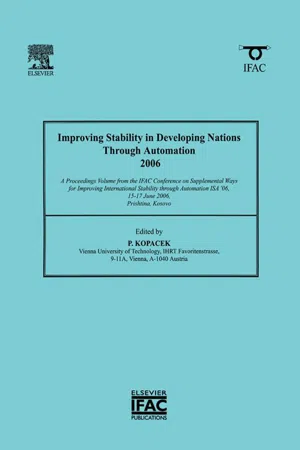Computer Science
Privacy Issues
Privacy issues in computer science refer to concerns related to the protection of personal information and data. This includes issues such as unauthorized access to sensitive data, data breaches, and the collection and use of personal information without consent. Addressing privacy issues is crucial for ensuring the security and confidentiality of individuals' data in digital environments.
Written by Perlego with AI-assistance
Related key terms
1 of 5
8 Key excerpts on "Privacy Issues"
- eBook - PDF
Technoscientific Research
Methodological and Ethical Aspects
- Roman Z. Morawski(Author)
- 2019(Publication Date)
- De Gruyter(Publisher)
The most frequently addressed issues of computer ethics are: protection of data confidentiality, protection of intellectual prop- erty, fair access to information and reliability of operations performed on information. Both individual computers and computer networks (local, regional and global) can be used to commit common crimes, to violate privacy or to conduct espionage. They can cause damage to individuals or institutions if the software does not work as expected, because of a programmer’s error or his deliberate action; they can perform sophisticated logical and mathematical operations whose correctness cannot be checked by anybody. Computer ethics is to determine to what extent and in what sit- uations we can trust computer systems, and what restrictions should be imposed on their use. IT means can be used for performing illegal operations, being serious ethi- cal violations, which are, however, neither specific to the scientific community nor very frequent among its members; therefore, they will not be discussed here. The spectrum of IT-related ethical issues is systematically expanding with the de- velopment of IT, and it is increasingly more and more identified with the spectrum of ethical issue related to the infosphere. This is because the social impact of the IT de- velopment is becoming more and more recognised, and – consequently – ethical de- mands regarding the “ecological” management of the infosphere are more and more explicitly articulated. The relevant public debates focus on such issues as: – the IT-induced evolution of the social context in which ethical problems, unre- lated to technology, appear and are solved; – the increase in the objective scope and subjective sense of anonymity of opera- tions performed on information; – the fuzzification of responsibility and increased sense of impunity for unethical processing of information. - eBook - PDF
Ethics and Technology
Controversies, Questions, and Strategies for Ethical Computing
- Herman T. Tavani(Author)
- 2016(Publication Date)
- Wiley(Publisher)
So even if you have never owned or used a computer, cell phone, (Internet‐enabled) electronic device, and so forth, your privacy is threatened in ways that were not possible in the past. Concerns about privacy now affect many aspects of one’s life—from commerce to health- care to work to recreation. So, some analysts organize these concerns into categories such as consumer privacy, medical/healthcare privacy, employee/workplace privacy, etc. Although some cyber‐related privacy concerns are specific to one or more spheres or sectors—that is, employment, healthcare, and so forth—others cut across multiple dimensions of our lives and thus affect each of us regardless of our employment or health status. Unfortunately, we cannot examine all of the current privacy concerns in a single chapter. So, we will have to postpone our analysis of certain kinds of Privacy Issues until the later chap- ters in the book. For example, we will examine some cyber‐related privacy concerns that con- flict with cybersecurity issues and national security interests in Chapter 6, where privacy‐related concerns affecting “cloud computing” are also considered. Some specific employee/workplace privacy‐related issues are examined in our discussion of workplace surveillance and employee monitoring in Chapter 10. And in our analysis of emerging and converging technologies (such as nanotechnology and ambient intelligence) in Chapter 12, we examine some controversies surrounding a relatively new category of privacy called “location privacy.” Despite the significant impact that cybertechnology has had and continues to have for our privacy, one still might ask: Do any of the current privacy concerns differ in kind from Privacy Issues that arose in the predigital era? In other words, is there anything new, or even special, about cyber‐related Privacy Issues? We next propose a strategy for addressing that question. - eBook - PDF
Human Computer Interaction Handbook
Fundamentals, Evolving Technologies, and Emerging Applications, Third Edition
- Julie A. Jacko(Author)
- 2012(Publication Date)
- CRC Press(Publisher)
Although usability has been identified as a major challenge to moving the results of security and privacy research into use in real systems, it is not clear that this chal-lenge has reached the interdisciplinary researchers needed to carry out the complex agenda of work. We see privacy as a complex social issue concerned with individuals’ rights to know what information is collected about them and how it might be used. We do not see a solu-tion for appropriate use of information through identification of a single policy or approach for information privacy, but argue as others have that consideration of privacy and tools to enable it need to develop hand in hand (e.g., Iachello and Abowd 2008). Technology is forcing us to rethink how we think about privacy—how much of it we want and how we can control it. This is not a simple user productivity issue, nor is it an issue we expect to see “resolved.” We fully expect that we will see rapid changes in this arena over the next decades. We see security as an issue that will also evolve rapidly as technology develops. As we rely more and more on technology in our daily lives, we need to know that the technology func-tions as expected and is not subject to malicious modification in behavior. This will continue to be dealt with as both a tech-nical issue in which guidance is to minimize the human role in the development of secure systems, and as a socio-technical issue in which the users of the technology play an important role in keeping the systems secure. The role of HCI research in security is less clearly defined than it is for privacy in that it is easier to consider our information privacy “requirements” and to imagine technology that would enable those require-ments than it is to consider our information system security “requirements” and the technology that would enable those. - eBook - PDF
- G.Michael Schneider, Judith Gersting(Authors)
- 2018(Publication Date)
- Cengage Learning EMEA(Publisher)
For example, you have read about the mathematics of algorithmic efficiency (Chapter 3), the hardware implementation of computer systems (Chapters 4 and 5), computer networks (Chapter 7), and software development (Chapters 9 and 10). However, in this chapter, we focus on the human issues lurking behind these technical details. We can’t provide a comprehensive list of such issues; such a list would be way too long, and it is growing daily. Instead, we introduce skills that will help you to think and reason carefully when mak-ing personal decisions about computing. This chapter also discusses impor-tant societal issues related to information technology and personal privacy and points you toward resources to help you explore these issues in greater detail. Making critical decisions about computing technology is unavoid-able. Increasingly, our society is being driven by the access to and control of Copyright 2019 Cengage Learning. All Rights Reserved. May not be copied, scanned, or duplicated, in whole or in part. Due to electronic rights, some third party content may be suppressed from the eBook and/or eChapter(s). Editorial review has deemed that any suppressed content does not materially affect the overall learning experience. Cengage Learning reserves the right to remove additional content at any time if subsequent rights restrictions require it. 793 information. As citizens of our communities, our country, and the world, we want our decisions to be well informed and well reasoned. Whenever humans make decisions about things they value, there are con-flicts and trade-offs. The field of ethics , the study of moral philosophy, has a long history of looking at how to identify and resolve such conflicts, and we will borrow from several classical theories of ethics. In this chapter, we pres-ent a number of case studies built around complex ethical issues related to computing and information. - eBook - PDF
- Debra Zahay, Mary Roberts(Authors)
- 2018(Publication Date)
- Cengage Learning EMEA(Publisher)
455 Social and Regulatory Issues: Privacy, Security, and Intellectual Property LEARNING OBJECTIVES By the time you complete this chapter, you will be able to: 1. Discuss trust as a facilitator of internet activity. 2. List some of the concerns consumers have about the privacy of their personally identifiable information. 3. Discuss the Privacy Issues that are especially applicable to users of social networks. 4. Identify consumer concerns about privacy and security in the mobile space. 5. Describe privacy protection efforts that affect children, financial, and health data. 6. Identify actions being taken by businesses to protect personally identifiable information. 7. Identify the Fair Information Practices Principles. 8. Discuss self-regulation and regulatory action to protect privacy in countries other than the United States. Chapter 17 Copyright 2018 Cengage Learning. All Rights Reserved. May not be copied, scanned, or duplicated, in whole or in part. Due to electronic rights, some third party content may be suppressed from the eBook and/or eChapter(s). Editorial review has deemed that any suppressed content does not materially affect the overall learning experience. Cengage Learning reserves the right to remove additional content at any time if subsequent rights restrictions require it. 456 Chapter 17 • Social and Regulatory Issues: Privacy, Security, and Intellectual Property 9. Explain the significance of data breaches and other threats to the security of consumer data. 10. Discuss significant issues related to the protection of intellectual property on the internet. From the origin of the internet as a project sponsored by the U.S. Department of Defense to its current status as a global network, the relationships among internet users, governmental agencies, and the public at large have often been strained. The internet boasts a tradition of free speech and a “caveat emptor” attitude toward infor- mation and activities that take place there. - No longer available |Learn more
The Handbook of Privacy Studies
An Interdisciplinary Introduction
- Bart van der Sloot, Aviva de Groot, Bart van der Sloot, Aviva de Groot(Authors)
- 2018(Publication Date)
- Amsterdam University Press(Publisher)
Now that a broad intuition of privacy has been given, an intuition of informatics follows. Further on, the relation between privacy and informatics will be def ined in terms of the importance of information security to privacy. 5.1.2 An intuition of informatics In this chapter, ‘informatics’ is meant in the sense of ‘Information and Communication Technology’ (ICT): the hardware and software that spawn from science, technology, engineering, and mathematics (STEM) and en-able storage, processing, and communication of data. Relevant academic disciplines include, inter alia, computer science, electrical engineering, information science, and logic. For two reasons, this chapter does not focus on a single STEM discipline, but on applications of their, often joint, outcomes. First, legibility must be maintained for readers that have no background in STEM disciplines. Second, Privacy Issues are often not yet suf fic iently clear in the course of practising any single discipline without considering specif ic applications. For instance, design of computer networking and wireless communication 3 Nissenbaum 2010. 4 boyd, 2008. (Note: boyd spells her Christian name and surname in lowercase, as explained here: http://www.danah.org/name.html.) PRIVACY FROM AN INFORMATICS PERSPECTIVE 215 protocols may focus firstly on achieving robust and ef fic ient means of communication, and not always take security and privacy requirements into account that emerge in their use in certain application domains. Similarly, the fundamentals of artif ic ial intelligence are purely mathematical, and not until the mathematics are applied to specif ic domains (healthcare, public security, insurance, and so on), specif ic security and privacy risks start to become clear. The design and use of ICT for the processing of personal data by defin ition relates to privacy. - Peter Kopacek(Author)
- 2007(Publication Date)
- Elsevier Science(Publisher)
Part 4 Privacy, Security and Ethical Issues Current Ethical Scruples Concerning Information Engineering Tibor Vámos [email protected] Computer and Automation Research Institute, Hungarian Academy of Sciences H-1111 Budapest, Lágymányosi u. 11., Hungary Abstract In the irresistible emergence of e-society the individual is represented by his/her electronic identity. The theoretical and practical pros and cons of electronic identity are treated, the harmonization and contradictions of privacy and security interests, and their relationship to the principles of liberty and solidarity, individual and society. The issues of democratic control and influence to further developments of democracy are discussed with a special focus on the ethical duties and possible actions of the engineering community, with some references to the dramatic events of global terrorism, extreme fundamentalism and to the local efforts of Hungarian Information technology. Keywords Social behavioural sciences social impact linguistic support 1 INTRODUCTION Through out the ages, no responsible professional activity has existed without scruples. Though, in our age unscrupulous behaviour is, in technologically advanced countries, less of a danger than it used to be earlier, even in the 20 th century. The other addendum is the requisite of the concept of professional responsibility; the quality of being scrupulous, scrupulous in his/her science, personal competence and especially in considering the consequences of his/her results. The characteristic difference in our age is the ubiquity of science and science-originated technology in every relation of human life and the special role of information, disseminated and transmitted globally, as the fundamental vehicle in human action and society organization- eBook - PDF
- R. Kelly Rainer, Brad Prince(Authors)
- 2021(Publication Date)
- Wiley(Publisher)
Responsibility means that you accept the conse- quences of your decisions and actions. Accountability refers to determining who is responsible for actions that were taken. Lia- bility is a legal concept that gives individuals the right to recover the damages done to them by other individuals, organizations, or systems. The major ethical issues related to IT are privacy, accuracy, prop- erty (including intellectual property), and access to information. Privacy may be violated when data are held in databases or transmitted over networks. Privacy policies that address issues of data collection, data accuracy, and data confidentiality can help organizations avoid legal problems. 3.2 Discuss at least one potential threat to the privacy of the data stored in each of three places that store personal data. Privacy is the right to be left alone and to be free of unreasonable per- sonal intrusions. Threats to privacy include advances in information technologies, electronic surveillance, personal information in data- bases, Internet bulletin boards, newsgroups, and social networking sites. The privacy threat in Internet bulletin boards, newsgroups, and social networking sites is that you might post too much personal infor- mation that many unknown people can see. POM For the Production/Operations Management Major POM professionals decide whether to outsource (or offshore) man- ufacturing operations. In some cases, these operations are sent overseas to countries that do not have strict labor laws. This situ- ation raises serious ethical questions. For example: Is it ethical to hire employees in countries with poor working conditions in order to reduce labor costs? HRM For the Human Resource Management Major Ethics is critically important to HR managers. HR policies define the appropriate use of information technologies in the workplace.
Index pages curate the most relevant extracts from our library of academic textbooks. They’ve been created using an in-house natural language model (NLM), each adding context and meaning to key research topics.







